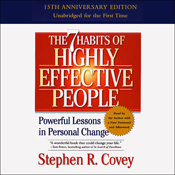 Free audio book : The Seven Habits of Highly Effective People
Free audio book : The Seven Habits of Highly Effective People
The Seven Habits of Highly Effective People
Restoring The Character Ethic
By Stephen R. Covey
Now, if for some reason you have some 'bad qualities' like me for being really, really, lazy (sometimes) and grumpy when it comes to reading long texts (most of the time), why not do yourself a favor and download the audio version of this book and listen to it? Yes, it's that simple. Agree? okay now, hurry up, go ahead download the audio version available for free from these sites MegaUpload or Audible.com (hope the links still work). Save it on your computer or mp3 player or flash/thumb disc or burn it in an audible CD and listen to it on your CD player or car.
 Habit 1 Be Proactive: Principles of Personal Choice
Habit 1 Be Proactive: Principles of Personal ChoiceHabit 2 Begin with the End in Mind: Principles of Personal Vision
Habit 3 Put First Things First: Principles of Integrity & Execution
Habit 4 Think Win/Win: Principles of Mutual Benefit
Habit 5 Seek First to Understand, Then to be Understood: Principles of Mutual Understanding
Habit 6 Synergize: Principles of Creative Cooperation
Habit 7 Sharpen the Saw: Principles of Balanced Self-Renewal
Borrowing slightly from the concepts of Quantum Mechanics, The Seven Habits of Highly Effective People begins with the astute observation that people perceive the world differently, and because we view the world with our own unique "lens," it is difficult to separate the observation from the observer.
Covey says that we all have our own paradigm, which is our own map of how we perceive the world and how we think the world should be in our ideal view. Covey writes, "The way we see things is the source of the way we think and the way we act." ...these paradigms are the source of our attitudes and behaviors. We cannot act with integrity outside of them. We simply cannot maintain wholeness if we talk and walk differently than we see. ... To try to change outward attitudes and behaviors does very little good in the long run if we fail to examine the basic paradigms from which those attitudes and behaviors flow." Sometimes, just a little more knowledge might help us examine our paradigms.
He says, although many people want to be effective in their lives and achieve certain goals/dreams, they are unwilling to honestly examine their own paradigms. They are unwilling to look at the way they look at things.
He tells the story of a manager who has taken management training classes and seminars and who is friendly to his employees. Yet, he doesn't feel that his employees have any loyalty toward him. He feels they lack independence and responsibility. If he took a day off, he believes his employees would goof off and stand around the water cooler talking all day.
Covey suggests the manager ask himself, "But is it possible that under that apparent disloyal behavior, these employees question whether I really act in their best interest? Do they feel like I'm treating them as mechanical objects? ..."
Our paradigms will affect how we interact with others, which in turn will affect how they interact with us. So, Covey argues, any effective self-help program must begin with an "inside-out" approach, rather than looking at our problems as "being out there" (an inside-out approach). We must start by examining our own character, paradigms, and motives.
Covey says in the inside-out approach says "If you want to have a happy marriage, be the kind of person who generates positive energy and sidesteps negative energy rather than empowering it. If you want to have a more pleasant, cooperative teenager, be a more understanding, empathic, consistent, loving parent. If you want to have more freedom, more latitude in your job, be a more responsible, a more helpful, a more contributing employee. If you want to be trusted, be trustworthy. If you want the secondary greatness of recognized talent, focus first on primary greatness of character."
Hence, character and principles are keys to success, effectiveness, and happiness in life. "Principles are guidelines for human conduct that are proven to have enduring, permanent value. ...one way to quickly grasp the self-evident nature of principles is to simply consider the absurdity of attempting to live an effective life based on their opposites. I doubt that anyone would seriously consider unfairness, deceit, baseness, uselessness, mediocrity, or degeneration to be a solid foundation for lasting happiness and success."
A summary slightly modified from by Bainvestor.com on Seven Habits Eeffectiveness and Wikipedia on The_Seven_Habits_of_Highly_Effective_People
You really need to listen to this powerful book.



0 feedback :